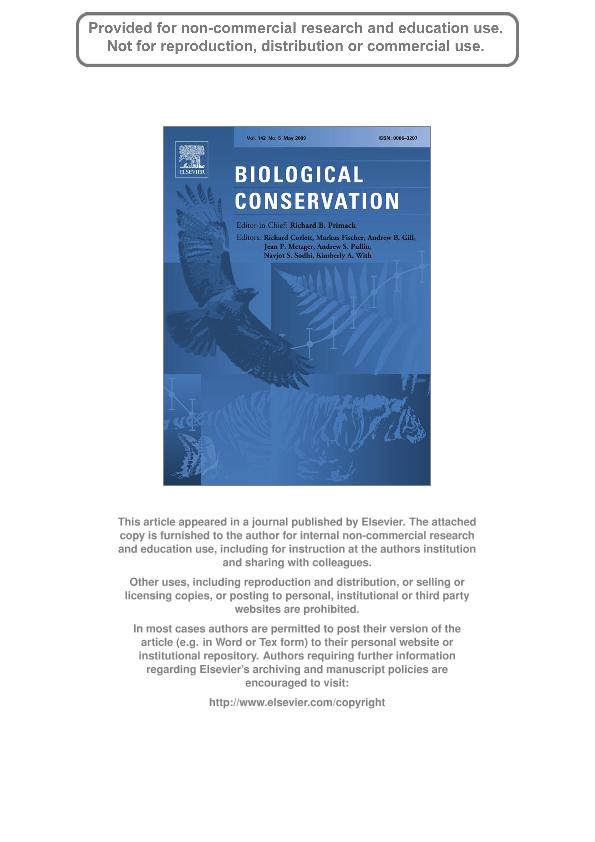Mostrar el registro sencillo del ítem
dc.contributor.author
Ashworth, Lorena

dc.contributor.author
Quesada, Mauricio
dc.contributor.author
Casas, Alejandro
dc.contributor.author
Aguilar, Ramiro

dc.contributor.author
Oyama, Ken
dc.date.available
2017-09-14T18:47:19Z
dc.date.issued
2009-03
dc.identifier.citation
Ashworth, Lorena; Quesada, Mauricio; Casas, Alejandro; Aguilar, Ramiro; Oyama, Ken; Pollinator-dependent food production in Mexico; Elsevier; Biological Conservation; 142; 5; 3-2009; 1050-1057
dc.identifier.issn
0006-3207
dc.identifier.uri
http://hdl.handle.net/11336/24270
dc.description.abstract
Animal pollination is one of the essential services provided by ecosystems to humans. In the face of a potential worldwide pollination crisis it is important to assess which countries may be more vulnerable in order to prioritize pollinator conservation efforts. The poverty level, the population density and the level of pollinator dependence for food provisioning are key aspects to identify vulnerable countries. We evaluate these aspects and determine the level of human food provisioning dependence on pollinators in Mexico, a developing and highly populated country. The diversity of crop species in Mexico is exceptionally high. Nearly 85% of fruit and/or seed consumed species depend to some degree on pollinators for productivity. Overall, pollinator-dependent crops generate larger income but cover a lower cultivated area and produce less volume compared to non-pollinator-dependent crops. Volume per unit area, however, as well as revenue per unit area, is much higher for pollinator-dependent crops. Native wild pollinators also play a key role in fruit or seed production of Mexican domesticated plant species and in the reproduction of many useful wild species. Thus, assuring free pollination services is particularly important in Mexico as the livelihood of a large proportion of the population exclusively and directly depends on ecosystem services for subsistence. Feasible conservation strategies involve the payment of environmental services to Ejidos (communal land tenure systems) making efforts to protect or restore plant resources and native pollinators, and the creation of new protected natural areas, which ensures food provision, mating and nesting sites for pollinators.
dc.format
application/pdf
dc.language.iso
eng
dc.publisher
Elsevier

dc.rights
info:eu-repo/semantics/openAccess
dc.rights.uri
https://creativecommons.org/licenses/by-nc-nd/2.5/ar/
dc.subject
Agriculture
dc.subject
Food Diversity
dc.subject
Plant Species Domestication
dc.subject
Pollination Service
dc.subject.classification
Bioquímica y Biología Molecular

dc.subject.classification
Ciencias Biológicas

dc.subject.classification
CIENCIAS NATURALES Y EXACTAS

dc.title
Pollinator-dependent food production in Mexico
dc.type
info:eu-repo/semantics/article
dc.type
info:ar-repo/semantics/artículo
dc.type
info:eu-repo/semantics/publishedVersion
dc.date.updated
2017-09-11T17:53:22Z
dc.journal.volume
142
dc.journal.number
5
dc.journal.pagination
1050-1057
dc.journal.pais
Países Bajos

dc.description.fil
Fil: Ashworth, Lorena. Consejo Nacional de Investigaciones Científicas y Técnicas. Centro Científico Tecnológico Conicet - Córdoba. Instituto Multidisciplinario de Biología Vegetal. Universidad Nacional de Córdoba. Facultad de Ciencias Exactas Físicas y Naturales. Instituto Multidisciplinario de Biología Vegetal; Argentina. Universidad Nacional Autónoma de México; México
dc.description.fil
Fil: Quesada, Mauricio. Universidad Nacional Autónoma de México; México
dc.description.fil
Fil: Casas, Alejandro. Universidad Nacional Autónoma de México; México
dc.description.fil
Fil: Aguilar, Ramiro. Consejo Nacional de Investigaciones Científicas y Técnicas. Centro Científico Tecnológico Conicet - Córdoba. Instituto Multidisciplinario de Biología Vegetal. Universidad Nacional de Córdoba. Facultad de Ciencias Exactas Físicas y Naturales. Instituto Multidisciplinario de Biología Vegetal; Argentina. Universidad Nacional Autónoma de México; México
dc.description.fil
Fil: Oyama, Ken. Universidad Nacional Autónoma de México; México
dc.journal.title
Biological Conservation

dc.relation.alternativeid
info:eu-repo/semantics/altIdentifier/doi/https://doi.org/10.1016/j.biocon.2009.01.016
dc.relation.alternativeid
info:eu-repo/semantics/altIdentifier/url/http://www.sciencedirect.com/science/article/pii/S0006320709000512
Archivos asociados
